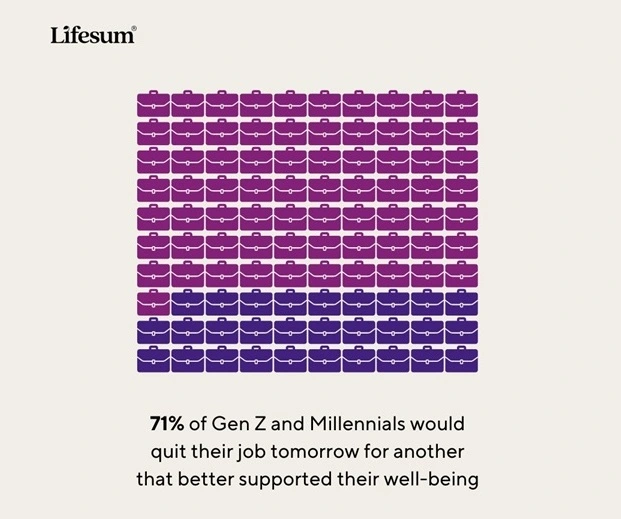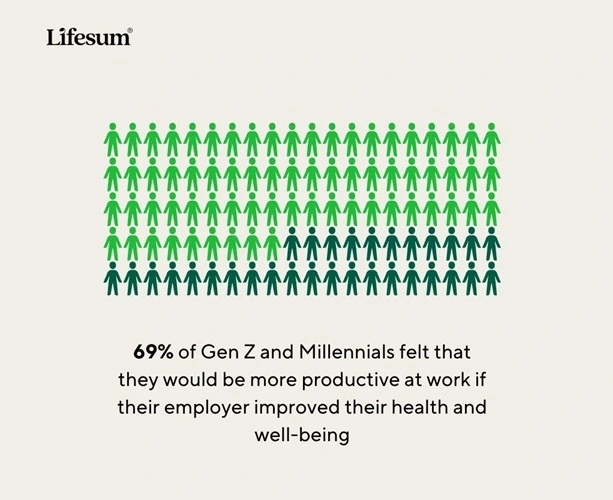Do Employers Need a ‘Wake Up Call’ on Corporate Wellness?

Stressed-out Gen Z and Millennial workers are at a breaking point and are prioritizing well-being in their career choices, Lifesum finds
The key to engaged, productive Gen Z and Millennial employees is an investment in well-being, finds Lifesum, a global healthy eating platform used by Amazon, GE and PayPal.
At the core of Lifesum’s recent 2024 State of Healthy Eating and Well-being report is an eye-opening statistic that nearly 71% of Gen Z and Millennials would quit their job tomorrow in favor of one that better supports their overall well-being. The report also highlights the projected trends stemming from the desires of the most coveted consumers.
The healthy eating platform surveyed 10,000 Gen Z and Millennials, finding that 69% would be more productive if their employer improved their well-being. Meanwhile, 31% would even consider a pay cut in exchange for a happier and healthier work environment, showing just how invested young workers are in their well-being.
Markus Falk, Lifesum CEO, says the report is a “wake-up call” for employers who need to grasp the needs of Gen Z and Millennials, who he says are redefining company loyalty by prioritizing personal well-being in career choices.
“The report underscores how a nutrition-first approach can foster long-term well-being, benefiting mental, physical and emotional health,” Falk said. “This, in turn, enhances workplace productivity and satisfaction.”

An accurate picture of overwhelmed Gen Z and Millennials has continued to materialize, as seen by the American Psychological Association’s 2023 Stress in America findings. The report sounds the alarm that younger populations are not only plagued with stress but demonstrate higher stress levels than the generations before them. Experts say inflation, isolation and difficulty accessing health care are all contributing factors.
With numerous stressors swirling around in the minds of Gen Z and Millennial workers, Lifesum points out that employers can assist staff in resiliency-supporting corporate wellness offerings that benefit staff but also reduce absenteeism, boost productivity and increase a company’s bottom line.
Lifesum’s 2024 State of Healthy Eating and Well-being report dived into factors that the platform says create a fulfilling work experience, such as health and wellness goals, mental health and sleep.
Here are the findings:
Young Consumers Snack Their Way to Wellness
Gen Z and Millennials ranked their top three health and wellness goals with physical fitness leading the charge (88%), followed by mental health and stress management (71%) and then sleep quality (54%).
Lifesum found that workplace stress is deemed a “critical concern” for young workers, with 75% willing to cut ties with their employer over a toxic working environment.
The report also highlighted emerging trends in the health and wellness space, with functional foods resonating with Gen Z and Millennials, 73% of whom eat for “enhanced energy,” while 61% are looking for improved mental health. Lifesum found that 40% eat their way to more restful sleep, noting that “snackable supplements” that incorporate valuable vitamins and protein are popular with younger consumers.
Lifesum projects that this year will see a rise in stress-relieving adaptogenic foods, such as mushroom latte powders, and sleep-inducing foods with melatonin and magnesium.
Target has also ramped up its shelves and ecommerce site with over a thousand wellness-supporting products at cost-conscious price points across skincare, supplements, functional beverages, vitamins and more — seemingly to prepare for wellness-seeking young consumers.
The Intersection of Sleep & Nourishment
As stress plays a significant role in eating habits and sleep quality, it makes sense that Gen Z and Millennials are looking to improve on all ends — and are aware of the connection between sleep and nutrition. With one in three Americans not getting enough sleep, Mindbody predicted that sleep hygiene will be a top trend for 2024 — a finding supported by Lifesum.
Lifesum’s report found that 50% of respondents say their dietary decisions are essential to their energy levels during the day, while 83% seriously contemplate modifying their eating habits in exchange for a more restful sleep.

Based on those findings, Lifesum predicts that there will be a rise in foods rich in sleep-inducing nutrients and tech-based solutions such as its sleep tracking feature with Oura, which gives users a behind-the-scenes look into how diet impacts sleep patterns (and vice versa).
“Gen Z and Millennials deeply value the intersection of sleep and nutrition,” Falk said. “Corporate wellness programs will increasingly acknowledge how sleep and nutrition impact productivity and overall well-being, which will lead to a comprehensive strategy that optimizes a healthy work-life balance.”
Drivers of the Longevity Boom
The growing awareness of longevity modalities may have wellness seekers rushing to book IV drips, saunas and cold plunges. Still, Gen Z and Millennials are already ahead of the game, with 51% of survey respondents sharing that they are actively engaged in longevity and well-being practices. Moreover, 56% consider taking “immediate action” to enhance longevity.
Such data is a solid foundation for a rise in personalized nutrition programs, sustainable and mindful eating habits and mental health programs, according to Lifesum.
“Organizational culture plays a pivotal role in shaping employee well-being and workplace outcomes,” Falk said. “The report underscores how Gen Z and Millennials use nutrition to promote overall wellness across various aspects of their lives. This will have a knock-on effect for employers and pave the way for nutrition-first corporate wellness strategies that optimize employee health and productivity.”



